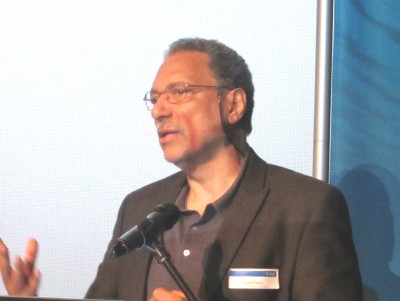 Ocean Wise celebrates 10th anniversary
Ocean Wise celebrates 10th anniversary
Global marine catches are going down. This is the sobering result of reconstructions of real catches around the world by the team of leading fisheries scientist Prof. Daniel Pauly. This contrasts with statistics compiled by FAO based on government reports.
Pauly's presentation started the symposium "From Fisheries To Foodies" with a bang. He told the public gathered on 27 April 2015 in the Vancouver Aquarium's auditorium and via web streaming elsewhere in Canada that official statistics painted a misleading picture of the state of the ocean's food production.
Moreover, governments almost always under-report what fisheries take out of the ocean, often dramatically so. The difference between official reporting and real extractions averages between 60 and 30% over the last fifty years.
 Much of the under-reporting concerns so called small-scale fisheries, which produce a large percentage of seafood for domestic consumption but even for international trade. But because these operate out of many small landing places and are often politically "invisible" or marginalised, few bother to record what they contribute. Then there is the share of often significant outright illegal catches, often by industrial fleets emptying the waters of developing countries unable to ensure demanding control and surveillance. The different forms of undesirable fisheries have been termed illegal, unregulated and unreport (IUU) fishing, which has become more serious in the last decades.
Much of the under-reporting concerns so called small-scale fisheries, which produce a large percentage of seafood for domestic consumption but even for international trade. But because these operate out of many small landing places and are often politically "invisible" or marginalised, few bother to record what they contribute. Then there is the share of often significant outright illegal catches, often by industrial fleets emptying the waters of developing countries unable to ensure demanding control and surveillance. The different forms of undesirable fisheries have been termed illegal, unregulated and unreport (IUU) fishing, which has become more serious in the last decades.
The result is a worrying degree of misconceptions about the real state of fisheries which needs to be rectified in the minds of political and economic decision makers and the general public if the rush towards emptying the ocean is to be reversed. Large marine protected areas and an end to perverse incentives favouring IUU fishing are among the measures towards recovery and sustainable seafood.
Click here to read the review of the whole Ocean Wise Seafood Symposium.








